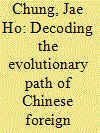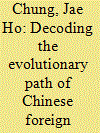|
|
|
Sort Order |
|
|
|
Items / Page
|
|
|
|
|
|
|
| Srl | Item |
| 1 |
ID:
107160


|
|
|
|
|
| Publication |
2011.
|
| Summary/Abstract |
Chinese foreign policy has made a grand transition during the post-Mao reform era. Chinese foreign policy of the 21st century has become much more open and pragmatic in its relations with the outside world, more extensive in its reach and coverage, highly diversified in its functions and partners, more committed to international norms than before, and much more sophisticated in its dealing with the international community. Yet, the precise balance between the changes and continuities is still quite difficult to gauge. Furthermore, despite crucial visible changes, concerns and worries - even some fears - are discernible with regard to the rise of China. In the last 60 years, Beijing has sought hard to sustain consistencies (shizhong ruyi) in its foreign policy. Perhaps, that is the best clue the world has in inferring the future trajectory of Chinese foreign policy.
|
|
|
|
|
|
|
|
|
|
|
|
|
|
|
|
| 2 |
ID:
107177


|
|
|
|
|
| Publication |
2011.
|
| Summary/Abstract |
Chinese foreign policy has made a grand transition during the post-Mao reform era. Chinese foreign policy of the 21st century has become much more open and pragmatic in its relations with the outside world, more extensive in its reach and coverage, highly diversified in its functions and partners, more committed to international norms than before, and much more sophisticated in its dealing with the international community. Yet, the precise balance between the changes and continuities is still quite difficult to gauge. Furthermore, despite crucial visible changes, concerns and worries - even some fears - are discernible with regard to the rise of China. In the last 60 years, Beijing has sought hard to sustain consistencies (shizhong ruyi) in its foreign policy. Perhaps, that is the best clue the world has in inferring the future trajectory of Chinese foreign policy.
|
|
|
|
|
|
|
|
|
|
|
|
|
|
|
|
| 3 |
ID:
145402


|
|
|
|
|
| Summary/Abstract |
North Korea's siege mentality is deeply rooted in negative experiences with out-groups in history. This worldview dominates its society and is the foundation of its mistrust toward the outside world. It has also become a crucial instrument for stable governance, social cohesion, and the regime's allocation of resources. However, in foreign affairs, negative or aggressive attitudes toward other nations are not beneficial for international cooperation and are more likely to intensify North Korea's isolation. Since a siege mentality is not an unchangeable disposition, its maintenance depends on deliberate reproduction by political, cultural, and educational mechanisms. The international community should assist North Korea to establish new ideas on threats, convey accurate information about out-groups, and reinterpret its views of the outside world.
|
|
|
|
|
|
|
|
|
|
|
|
|
|
|
|
|
|
|
|
|